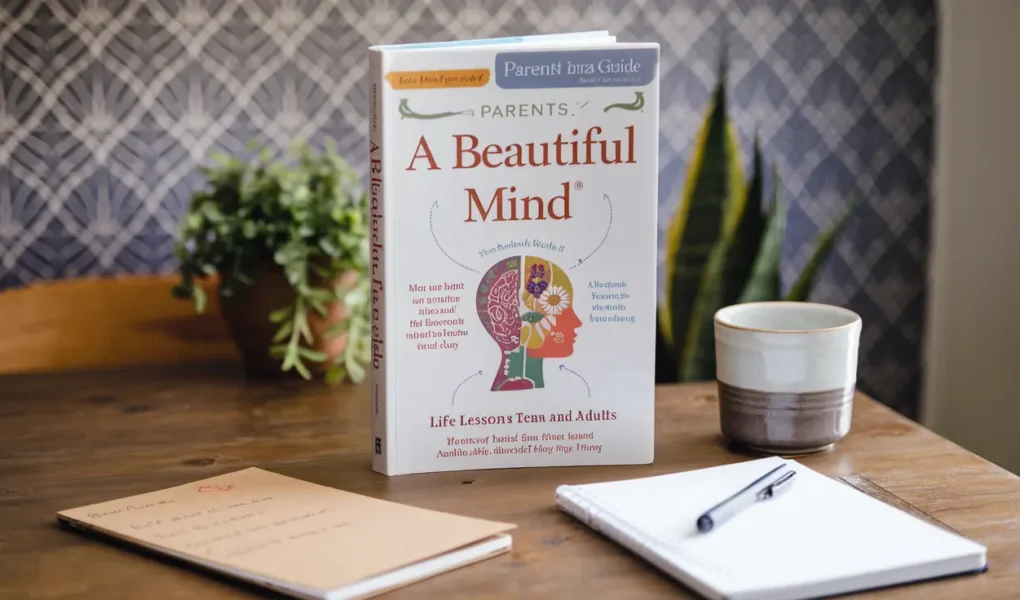A Beautiful Mind, the 2001 biographical drama directed by Ron Howard, tells the compelling story of John Nash, a brilliant mathematician who battles schizophrenia. The movie, inspired by real-life events, provides both inspiration and insight into mental health challenges. However, its mature themes and complex content make it essential for parents to understand before sharing it with their teens.
This guide explores key aspects of A Beautiful Mind and highlights its life lessons for teens and adults. From mental health awareness to the importance of resilience, we’ll unpack why this film is worth watching—and how to approach it thoughtfully with your family.
Understanding A Beautiful Mind
The movie chronicles the life of John Nash, a mathematical genius whose groundbreaking work changes the field of economics. However, Nash’s success comes at a cost. He struggles with paranoid schizophrenia, which distorts his reality and affects his relationships. Despite these challenges, Nash finds support in his wife and ultimately learns to manage his illness.
The story is deeply emotional and layered with themes of perseverance, love, and the human capacity for resilience.
Age Appropriateness: Is It Suitable for Teens?
A Beautiful Mind is rated PG-13. While teens may find the film engaging, it contains sensitive material. Parents should be aware of the following:
- Mature Themes: The movie addresses mental illness, delusions, and hallucinations. These themes require a mature perspective to understand fully.
- Emotional Intensity: Scenes of Nash’s breakdowns and hospitalizations are emotionally heavy.
- Language: Mild profanity is present but not excessive.
- Violence: Some scenes portray self-harm and emotional distress.
Parents should assess whether their teen can handle these elements and consider watching the film together to provide context.
Life Lessons from A Beautiful Mind
The movie offers profound lessons applicable to both teens and adults. Here are the key takeaways:
1. Mental Health Awareness
John Nash’s battle with schizophrenia highlights the challenges of living with a mental illness. It shows the importance of early diagnosis, professional help, and support systems.
Lesson: Mental health is just as vital as physical health. Encourage open conversations about feelings and seeking help when needed.
2. Resilience in Adversity
Despite his struggles, Nash continues to pursue his passion for mathematics. His determination inspires viewers to keep moving forward, even when life gets tough.
Lesson: Teach teens to embrace challenges and work through setbacks with perseverance.
3. The Power of Support Systems
Nash’s wife, Alicia, plays a crucial role in his journey. Her unwavering support reminds us of the impact of love and understanding in overcoming difficulties.
Lesson: Build strong, supportive relationships and emphasize the value of being there for loved ones.
4. Balancing Ambition and Reality
Nash’s obsession with his work blinds him to the warning signs of his illness. The film teaches the importance of self-awareness and balance.
Lesson: Help teens prioritize self-care while pursuing their goals.
5. The Value of Seeking Help
Nash initially resists treatment, believing he can manage on his own. The movie underscores the necessity of professional intervention.
Lesson: Remind teens and adults that seeking help is a sign of strength, not weakness.
Tips for Watching the Movie with Teens
Here’s how parents can make A Beautiful Mind a meaningful experience for their teens:
- Watch Together: Be present to guide discussions about sensitive topics.
- Discuss Mental Health: Use the film as a starting point to talk about mental health awareness and reducing stigma.
- Focus on Resilience: Highlight how Nash overcomes his struggles and achieves success.
- Answer Questions: Be prepared to explain complex themes, such as schizophrenia and its symptoms.
- Encourage Empathy: Talk about how the characters show compassion and understanding.
Key Themes to Explore
1. Understanding Schizophrenia
The film portrays schizophrenia as a condition that distorts reality. Nash’s hallucinations seem real to him, making it difficult to differentiate between fact and fiction.
Parents can use this as an opportunity to educate teens about mental illnesses and promote empathy for those who face similar challenges.
2. The Role of Family
Alicia Nash’s dedication showcases the strength of familial bonds. She exemplifies patience, love, and unwavering support, even in the face of hardship.
Discuss how family support can make a significant difference in overcoming life’s obstacles.
3. Triumph Through Acceptance
Nash’s acceptance of his condition marks a turning point in his journey. By learning to manage his symptoms, he regains control of his life.
Teach teens the importance of self-acceptance and adapting to circumstances.
Questions to Discuss After Watching
After the movie, consider these questions to spark meaningful conversations:
- How did Nash’s condition affect his personal and professional life?
- What role did Alicia play in helping Nash manage his illness?
- What does the film teach about perseverance?
- How can we reduce the stigma around mental health?
- What lessons can we apply to our own lives?
How A Beautiful Mind Inspires Teens and Adults
The film’s universal themes resonate across generations. Teens can learn the importance of resilience, self-awareness, and seeking help when needed. Adults can gain a deeper understanding of mental health challenges and the value of supportive relationships.
By watching this film together, families can foster empathy, inspire conversations about mental health, and instill valuable life lessons.
Final Thoughts
A Beautiful Mind is more than a movie—it’s a powerful narrative about the human spirit. Its lessons on mental health, resilience, and love make it a must-watch for teens and adults. By guiding your teen through its themes, you can help them appreciate its depth and apply its messages to their own lives.
Watching A Beautiful Mind as a family is an opportunity to grow, learn, and connect. Use this guide to ensure a thoughtful and enriching viewing experience.




